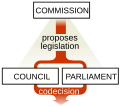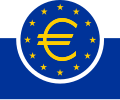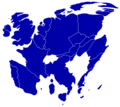Portal:European Union
Introduction
The European Union (EU) is a supranational political and economic union of 27 member states that are located primarily in Europe. The Union has a total area of 4,233,255 km2 (1,634,469 sq mi) and an estimated total population of over 449 million. The EU has often been described as a sui generis political entity combining the characteristics of both a federation and a confederation. Containing 5.8% of the world population in 2020, EU member states generated a nominal gross domestic product (GDP) of around US$16.6 trillion in 2022, constituting approximately one sixth of global nominal GDP. Additionally, all EU states except Bulgaria have a very high Human Development Index according to the United Nations Development Programme. Its cornerstone, the Customs Union, paved the way to establishing an internal single market based on standardised legal framework and legislation that applies in all member states in those matters, and only those matters, where the states have agreed to act as one. EU policies aim to ensure the free movement of people, goods, services and capital within the internal market; enact legislation in justice and home affairs; and maintain common policies on trade, agriculture, fisheries and regional development. Passport controls have been abolished for travel within the Schengen Area. The eurozone is a group composed of the 20 EU member states that have fully implemented the economic and monetary union and use the euro currency. Through the Common Foreign and Security Policy, the union has developed a role in external relations and defence. It maintains permanent diplomatic missions throughout the world and represents itself at the United Nations, the World Trade Organization, the G7 and the G20. Due to its global influence, the European Union has been described by some scholars as an emerging superpower. In 2012, the EU was awarded the Nobel Peace Prize. The United Kingdom became the only member state to leave the EU, in 2020; ten countries are aspiring or negotiating to join it. (Full article...) Selected article Hungary /ˈhʌŋɡəri/ (Hungarian: Magyarország [ˈmɒɟɒrorsaːɡ] ), officially the Republic of Hungary (Hungarian: Magyar Köztársaság , literally "Hungarian Republic"), is a landlocked country in Central Europe. It is situated in the Pannonian Basin and it is bordered by Slovakia to the north, Ukraine and Romania to the east, Serbia and Croatia to the south, Slovenia to the southwest and Austria to the west. The capital and largest city is Budapest. Hungary is a member of the European Union, NATO, the OECD, the Visegrád Group, and is a Schengen state. The official language is Hungarian, which is part of the Uralic family and is the most widely spoken non-Indo-European language in Europe. Selected picturePhotograph credit: Diego Delso This is a panoramic view of the interior of the Pula Arena, a Roman amphitheatre in Pula, Croatia. Constructed between 27 BC and AD 86, it is among the six largest surviving Roman arenas in the world, and is the best-preserved ancient monument in the country. The amphitheatre appears on the Croatian ten-kuna banknote.
Did you know?...that the President of Ireland, who serves as head of state, is elected for a seven year term and can be re-elected only once? ...that within the Eurozone the European Central Bank has the exclusive authority to set monetary policy? Selected cityWarsaw is the capital of Poland and its largest city. It is located on the Vistula river roughly 370 km from both the Baltic Sea coast and the Carpathian Mountains. Its population as of 2011 was estimated at 1.7 million with a metropolitan area of approximately 2.7 million. The city area amounts to 517 km², with an agglomeration of 6100.43 km². Warsaw is internationally notable for giving its name to the Warsaw Pact, Warsaw Convention and the Treaty of Warsaw. The city is home to many industries, including manufacturing, steel, electrical engineering, and automotive; it features 66 institutions of higher learning, including Warsaw University, Stefan Wyszyński University, Warsaw University of Technology, Warsaw School of Economics, and a Medical Academy. Warsaw is home to over 30 theatres, including the National Theatre and Opera and the National Philharmonic Orchestra. General imagesThe following are images from various European Union-related articles on Wikipedia.
TopicsFeatured contentFeatured articles
Featured lists
Featured contentGood articles
CategoriesRelated portalsAssociated WikimediaThe following Wikimedia Foundation sister projects provide more on this subject:
Discover Wikipedia using portals |
































































